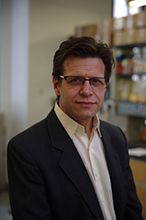Researchers
Marcelo Nociari, Ph.D.
Ching-Hwa Sung, Ph.D.
Professor, Ophthalmology and Cellular & Developmental Biology, Principal InvestigatorDr. Sung's laboratory research revolves around the molecular and cellular pathogenesis underlying Retinitis Pigmentosa (RP), Age-related Macular Degeneration (AMD) and Proliferative VitreoRetinopathy (PVR), as well as therapeutic interventions for these retinopathies.



